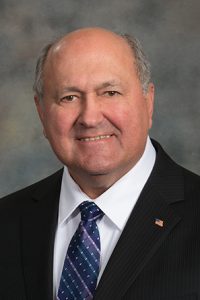Career-readiness, dual-credit education funding sought
The Legislature would provide additional funding for career-readiness and dual-credit education initiatives under a proposal heard Feb. 3 by the Education Committee.
Omaha Sen. Rick Kolowski, sponsor of LB1168, said the bill is related to LB920, introduced by Sen. Mike Groene of North Platte. Groene’s bill would allocate a portion of state lottery funds to certain education-related programs, including two that would be created by LB1168.
Both bills would direct 7 percent of education lottery funds—approximately $1.4 million the first year according to the state Department of Education—to career-readiness and dual-credit education from fiscal year 2021-22 through FY2025-26.
“With this relatively small amount of funding,” Kolowski said, “I think we can make a big impact on the availability of career and technical education classes and dual-credit classes.”
The bill would allocate the first $282,500 to a cash fund used to pay the annual fee for an online education and career planning tool.
LB1168 would allocate 45 percent of the remaining funds to a new grant program that would be administered by the Coordinating Council for Postsecondary Education. Under the program, the commission would distribute money to teachers enrolled in courses leading to qualification to teach dual-credit courses and career and technical education courses.
The commission also would create career education pathways that enable the instruction of those courses. In doing so, it would “correlate and prioritize teacher education pathways with Nebraska workforce demand.”
Additionally, the commission would create a directory of teacher education pathways in Nebraska identified by sequence and location.
The bill would allocate 15 percent of the remaining funds to another new program that would be administered by the state Department of Education. Beginning with school year 2021-22, the department would reimburse school districts for the amount they pay to reduce the fees charged to low-income students by certain college credit testing programs.
Kolowski estimated that the proposed funding would allow districts to waive the testing fee for 1,800 additional high school students.
Finally, the bill would direct 40 percent of the remaining funds to the existing Access College Early Scholarship Cash Fund. The ACE program, also administered by the commission, provides financial aid to low-income high school students who enroll in college courses through dual enrollment or early enrollment at Nebraska colleges or universities.
Mike Baumgartner, the commission’s executive director, testified in support of LB1168. In the past two years, he said, the commission has had to turn away approximately 500 ACE program applicants per year due to a lack of funding.
By directing lottery funds to the program for the first time, Baumgartner said, LB1168 would provide funding for at least that many additional scholarships per year.
Baumgartner said the bill also would help more teachers meet a new credentialing requirement set by the Higher Learning Commission, which accredits nearly all Nebraska colleges and universities. He said the commission now requires those who teach dual-enrollment courses to have a master’s degree in their content area or another area along with 18 graduate-level credit hours in their content area.
Jack Moles testified in support of the bill on behalf of the Nebraska Rural Community Schools Association, the Nebraska Council of School Administrators and the Nebraska Association of School Boards.
Moles said high school students in rural districts often do not have the same access to career-readiness and dual-credit classes as those who attend urban schools. LB1168 would help address that problem by enabling more teachers to earn the credentials they need to teach those classes, he said.
John Skretta, administrator of ESU 6, testified in support of LB1168 on behalf of a coalition of 19 midsized school districts.
Skretta said the bill likely would increase the rate at which students who take a dual-enrollment course, such as an Advanced Placement course, take the final exam. Taking the exam requires a fee but makes it more likely that the course credits will transfer to any postsecondary institution, he said.
Additionally, Skretta said, LB1168 would help teachers meet the rigorous new dual-enrollment credentialing requirement, which he said has exacerbated Nebraska’s teacher shortage in career and technical education as well as language arts, math and science. Some teachers who had taught those courses do not meet the new requirement because their master’s degree is not in their subject area, he said.
“The No. 1 barrier to sustaining robust dual-enrollment programming is almost certainly staffing,” Skretta said.
No one testified in opposition to the bill and the committee took no immediate action on it.

